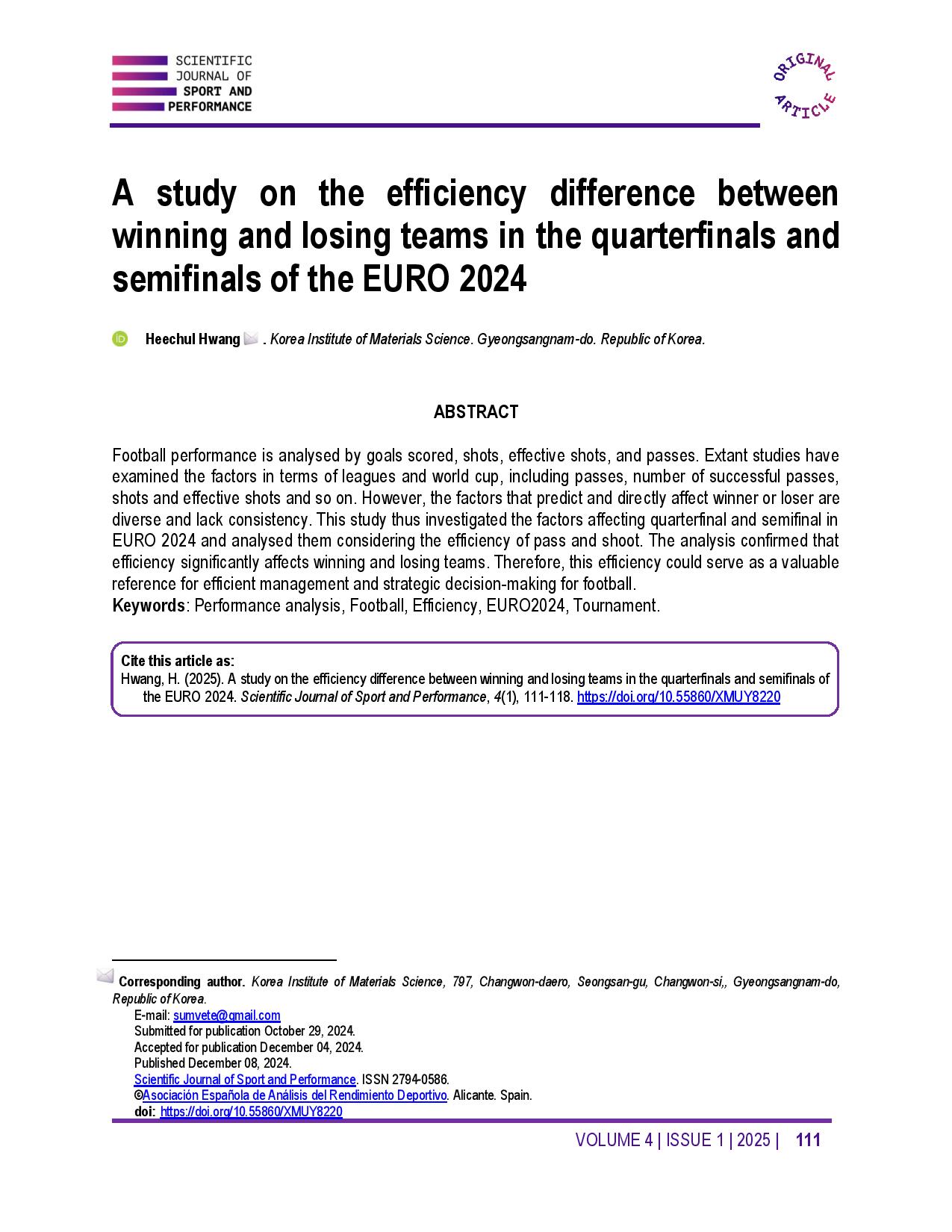A study on the efficiency difference between winning and losing teams in the quarterfinals and semifinals of the EURO 2024
Main Article Content
Abstract
Football performance is analysed by goals scored, shots, effective shots, and passes. Extant studies have examined the factors in terms of leagues and world cup, including passes, number of successful passes, shots and effective shots and so on. However, the factors that predict and directly affect winner or loser are diverse and lack consistency. This study thus investigated the factors affecting quarterfinal and semifinal in EURO 2024 and analysed them considering the efficiency of pass and shoot. The analysis confirmed that efficiency significantly affects winning and losing teams. Therefore, this efficiency could serve as a valuable reference for efficient management and strategic decision-making for football.
Article Details

This work is licensed under a Creative Commons Attribution-NonCommercial-ShareAlike 4.0 International License.
References
Alves, Danilo L., et al. "What variables can differentiate winning and losing teams in the group and final stages of the 2018 FIFA World Cup?." International Journal of Performance Analysis in Sport 19.2 (2019): 248-257. https://doi.org/10.1080/24748668.2019.1593096 DOI: https://doi.org/10.1080/24748668.2019.1593096
Broich, H., Mester, J., Seifriz, F., & Yue, Z. (2014). Statistical analysis for the First Bundesliga in the current soccer season. Prog App Math, 7(2), 1-8.
Charnes, A., Cooper, W. W., & Rhodes, E. (1978). Measuring the efficiency of decision making units. Eu J Oper Res, 2(6), 429-444. https://doi.org/10.1016/0377-2217(78)90138-8 DOI: https://doi.org/10.1016/0377-2217(78)90138-8
Collet, C. (2013). The possession game? A comparative analysis of ball retention and team success in European and international football, 2007-2010. J Sports Sci, 31(2), 123-136. https://doi.org/10.1080/02640414.2012.727455 DOI: https://doi.org/10.1080/02640414.2012.727455
Cooper, W. W., Seiford, L. M., & Tone, K. (2007). Data envelopment analysis: A comprehensive text with models, applications, references and DEA-solver software (Vol. 2). Springer. https://doi.org/10.1007/978-0-387-45283-8 DOI: https://doi.org/10.1007/978-0-387-45283-8
Espitia-Escuer, M., & Garcia-CebriÁn, L. I. (2004). Measuring the efficiency of Spanish first-division soccer teams. J Sports Econ, 5(4), 329-346. https://doi.org/10.1177/1527002503258047 DOI: https://doi.org/10.1177/1527002503258047
Espitia‐Escuer, M., & García‐CebriÁn, L. I. (2010). Measurement of the efficiency of football teams in the Champions League. Manag Decis Econ, 31(6), 373-386. https://doi.org/10.1002/mde.1491 DOI: https://doi.org/10.1002/mde.1491
Haas, D. J. (2003). Productive efficiency of English football teams-A data envelopment analysis approach. Manag Decis Econ, 24(5), 403-410. https://doi.org/10.1002/mde.1105 DOI: https://doi.org/10.1002/mde.1105
Haas, D., Kocher, M. G., & Sutter, M. (2004). Measuring efficiency of German football teams by data envelopment analysis. Cent Eu J Oper, 12(3), 251-268.
Harrop, K., & Nevill, A. (2014). Performance indicators that predict success in an English professional League One soccer team. Int J Perform Anal Spor, 14(3), 907-920. https://doi.org/10.1080/24748668.2014.11868767 DOI: https://doi.org/10.1080/24748668.2014.11868767
Hwang, H. C. (2022). Analysis of the effect of game efficiency of Korean professional soccer club on season performance. Korean Society for Sport Management, 27(6), 55-67. https://doi.org/10.31308/KSSM.27.6.55 DOI: https://doi.org/10.31308/KSSM.27.6.55
Hwang, H. C. (2024). Effect of pass and shoot efficiency: Analysis of Italian first league ranking. Journal of Human Sport and Exercise 19 (1), 139-147. https://doi.org/10.14198/jhse.2024.191.12 DOI: https://doi.org/10.14198/jhse.2024.191.12
Lago-Ballesteros, J., & Lago-Peñas, C. (2010). Performance in team sports: Identifying the keys to success in soccer. J Hum Kinet, 25(1), 85-91. https://doi.org/10.2478/v10078-010-0035-0 DOI: https://doi.org/10.2478/v10078-010-0035-0
Lago-Peñas, C., Lago-Ballesteros, J., & Rey, E. (2011). Differences in performance indicators between winning and losing teams in the UEFA Champions League. J Hum Kinet, 27(1), 135-146. https://doi.org/10.2478/v10078-011-0011-3 DOI: https://doi.org/10.2478/v10078-011-0011-3
Liu, Hongyou, et al. "Match statistics related to winning in the group stage of 2014 Brazil FIFA World Cup." Journal of sports sciences 33.12 (2015): 1205-1213. https://doi.org/10.1080/02640414.2015.1022578 DOI: https://doi.org/10.1080/02640414.2015.1022578
Oberstone, J. (2009). Differentiating the top English premier league football clubs from the rest of the pack: Identifying the keys to success. J Quant Anal Sports, 5(3), 10. https://doi.org/10.2202/1559-0410.1183 DOI: https://doi.org/10.2202/1559-0410.1183
Rossi, G., Goossens, D., Di Tanna, G. L., & Addesa, F. (2019). Football team performance efficiency and effectiveness in a corruptive context: The Calciopoli case. Eur Sport Manag Quart, 19(5), 583-604. https://doi.org/10.1080/16184742.2018.1553056 DOI: https://doi.org/10.1080/16184742.2018.1553056
Tenga, A., Ronglan, L.T., and Bahr, R. (2010). Measuring the effectiveness of offensive match-play in professional soccer. Eur J Sport Sci, 10(4), 269-277. https://doi.org/10.1080/17461390903515170 DOI: https://doi.org/10.1080/17461390903515170




